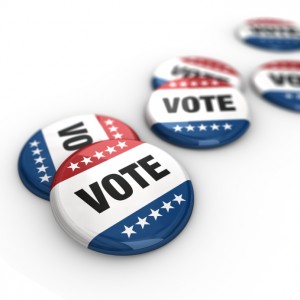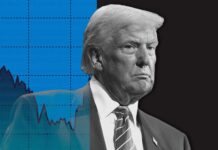Bullets whiz past the heads of soldiers crouched in their bunkers, bombs exploding, men screaming. Planes roar overhead and suspense builds as the men on the ground wait to find out if those planes are friendly or not. Bullets rain down from the sky, peppering the enemy. The victors celebrate, but only momentarily; the celebration stops when they see they are surrounded by carnage and blood and filth. The only thing that keeps these men going is the knowledge that they are fighting in the United States Military, a force of good, protecting democracy wherever it is threatened. The U.S has gone through great lengths to preserve democracy; it has fought wars, supported military coups, and put embargoes on other countries. So that when election time comes next year, all of the people who vote will remember those who have died in defense of democracy. They will be thankful that they do not live under the rule of a government that ignores them. They should vote knowing that the U.S is extremely hypocritical and disregards the principles democracy is built upon. The U.S ignores democracy and its citizens through the use of the Electoral College system.
The Electoral College is complicated, so here is a simplified version of how it works: The winner of the Presidential Election is decided by which candidate has more electoral votes. There are 538 electoral votes; these are based upon the number of people in Congress: the 100 members of the Senate and the 438 representatives in the House of Representatives. The electoral votes are divided up by state, all states have three (because each state has two senators and at least one representative), as well as some additional votes based upon any other representatives in the House that a state has. To begin the election process, a state holds elections, tallies up the votes, and sees who won. That candidate wins all of the Electoral College votes from that state (the states do not actually vote directly, but instead send electors to Washington under the assumption that they will accurately represent the results from their respective states). Then whichever candidate has the largest percentage of the electoral vote wins the election.
The electors are the first problem. They do not have to vote the way the people want. They can decide to vote differently. This was acceptable in the early years of the country as news didn’t travel fast, and the electors could make the most up-to-date decisions. However, we now live in a world of instant information and communication, so the electors should be obsolete. Now their power to change the vote is a danger and hindrance to democracy; it can ignore the voice of the people.
The Electoral College is comprised of 583 votes that are used to decide who will be president. In a perfect world, these votes would be divided up evenly, with every vote representing 592,000 people. The problem is that the states, not the people, get the votes. The votes should be based upon population, and somewhat are. States with bigger populations have more votes than states with smaller populations. However, Texas is six votes short of what it should have, and California is ten votes short. Meanwhile, Rhode Island and Vermont have extra votes. This happens because of an unholy mix of math and politics. Each state starts off with three votes, one for each senator, and one for each representative in the House. Then more votes are given based upon the population of a state. This sounds pretty fair, right? After all, the number of representatives from a state in the House of Representatives is determined by population as well. It is more complicated than that. While it sounds fair this way, it allows some states’ votes to count more than others. Mathematically speaking, Alaska’s votes are worth more than California’s. (All right, stay with me here, there is going to be some math involved) To calculate the weight of a vote, one must take the amount of citizens in a state, divide that by the number of votes (citizens per vote), and compare that to the population of the country divided by the number of electoral votes. Alaska has 736,732 people and three votes. 736,732/=about 250,000 citizens per vote. The population of the U.S is 318.9 million, and there are 538 votes. 318,900,000/538= about 600,000(rounding up). Divide the national number by Alaska’s number. 600,000/250,000= 2.4. The weight of one vote in the nation is, obviously, 1. The weight of a vote in Alaska is 2.4. After doing the math, the weight of a vote in California is 0.83. This now seems unfair, as people’s votes are now more or less equal than others. Just because someone lives in a certain state, their vote matters less than someone else’s. Democracy is when one vote equals one vote; the Electoral College is not very democratic.
Many people argue that the weird math is to ensure that candidates do not ignore small states, protecting the small states from being overshadowed by bigger ones. However, if this is the case, the Electoral College fails spectacularly. Due to the winner-take-all system, a candidate won’t try to campaign where they know they will win (or lose). The candidates tend to spend most of their campaign time and money in a handful of “swing states,” like Ohio, Florida, and Pennsylvania. This means that the size of a state is completely irrelevant to a candidate, what matters is the state’s political leaning. A largely red state like Texas or a largely blue state like California likely won’t change its leaning. However, in states like Ohio, there isn’t much leaning one way or the other, so the candidate will try to convince the residents of that state to vote for them. This means that many states, ranging from little Rhode Island to gargantuan California, are ignored. This also means that the candidate will try to cater to the will of only a few states, paying no attention to what the rest of the country wants. Voting directly would almost force candidates to pay attention to a wide demographic.
There is another huge problem with the Electoral College: losers can win. Due to the way the votes are weighted, winning a bunch of the small states means that the percentage of the Electoral College vote a candidate receives would go up much faster than the popular vote. In fact, a candidate only needs to win about twenty-two percent of the popular vote to win the Electoral College. As unlikely as this is to happen, there have been three times when the loser of the popular vote has won the Electoral College vote. It does not make sense for America to call itself a democracy when its elections can turn out against the majority. This goes against the very heart of American values, that the people should be the ultimate deciders.
The Electoral College allows representatives to vote against what the very people they represent want. It also favors some voters over others. The Electoral College even allows losers to win. This is not democracy, this is unacceptable.
Sources:
“Does my Vote Count?” David Walbert: http://www.learnnc.org/lp/media/lessons/davidwalbert7232004-02/electoralcollege.html#5b
“Why the Electoral College is bad for America” NPR: http://www.npr.org/templates/story/story.php?storyId=4115994
“10 Reasons why the Electoral College is a Problem” Erik Black: https://www.minnpost.com/eric-black-ink/2012/10/10-reasons-why-electoral-college-problem
“The Electoral College Should be Revised” Iowa State University: http://www.public.iastate.edu/~rhetoric/105H18/proposal/smw.htm






